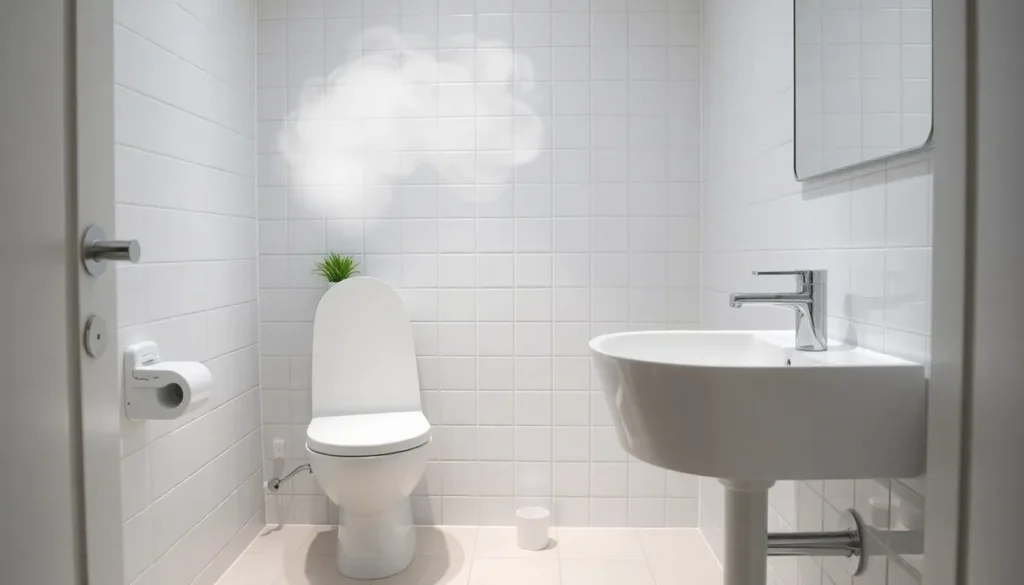Table of Contents
ToggleA whiff of sewage in the bathroom can turn a relaxing retreat into a scene straight out of a horror movie. While it might make one question their life choices, it’s more than just an unpleasant odor. That stinky smell could be a sign of underlying issues that need attention.
Is it just a funky reminder that someone didn’t flush? Or could it be a warning of something more sinister lurking beneath the surface? Understanding the dangers behind that odor is crucial for keeping a home safe and healthy. After all, nobody wants to play a game of “guess that smell” when it comes to their bathroom. Let’s dive into the murky waters of sewage smells and uncover the truth about their potential dangers.
Understanding Sewage Smell
Sewage smell in the bathroom can indicate serious problems. Recognizing these problems helps maintain a safe home environment.
Causes of Sewage Odor
Sewage odor typically arises from issues like clogged pipes or broken sewer lines. Drain traps that dry out can also lead to unpleasant smells. Inadequate ventilation often compounds the problem. Grease, hair, and soap buildup can contribute to blockages, resulting in odors. Poorly installed plumbing may allow sewer gases to escape, posing health risks. Regular maintenance prevents these issues and keeps bathrooms smelling fresh.
How to Identify Sewage Smell
Identifying sewage smell involves recognizing distinct signs. A strong, foul odor typically denotes a sewage problem. Sewer gas has a characteristic rotten egg scent due to hydrogen sulfide. Checking drains and toilets for visible leaks or moisture can indicate a deeper issue. If the smell persists after cleaning, underlying plumbing issues may exist. Homeowners should pay attention to the intensity and location of the smell to address potential hazards effectively.
Health Risks Associated with Sewage Smell

Sewage odors in a bathroom can indicate health risks. Understanding these dangers helps maintain a safe environment.
Short-term Effects
Encountering sewage smells can lead to immediate discomfort. Symptoms like nausea, headaches, and dizziness may occur. Exposure to hydrogen sulfide, a common component of sewage odors, can cause irritation in the eyes, nose, and throat. Short-term exposure may also trigger respiratory issues in sensitive individuals, particularly those with asthma. In some cases, someone might experience vomiting or fatigue. Prolonged exposure increases the chance of experiencing more severe symptoms. Prompt action to address the source of the smell is essential.
Long-term Health Impacts
Chronic exposure to sewage smells poses significant health risks. Long-term inhalation of sewer gases can lead to neurological issues, including memory loss and cognitive decline. Serious conditions like respiratory diseases may develop over time. Vulnerable populations, such as children and the elderly, face heightened risks. Continued exposure to harmful substances can result in complications for pre-existing health conditions. Seeking professional assistance to eliminate odors prevents these potential long-term consequences. Regular maintenance of plumbing systems can mitigate the dangers effectively.
Potential Sources of Sewage Smell in Bathrooms
Sewage smells in bathrooms frequently stem from specific sources. Understanding these potential origins helps homeowners address issues effectively.
Plumbing Issues
Clogged pipes often contribute to unpleasant odors. Grease, hair, and soap accumulate over time, leading to blockages. Broken sewer lines allow waste gases to escape, intensifying smells. Additionally, poorly installed plumbing can permit sewer gases to infiltrate indoor spaces. Regular inspections help identify and resolve these plumbing issues before they worsen.
Ventilation Problems
Inadequate ventilation exacerbates sewage odors. Without proper airflow, moisture builds up, creating a breeding ground for mildew and bacteria. Bathrooms lacking exhaust fans struggle to maintain a fresh environment. Opening windows enhances circulation, but this solution isn’t always available. Ensuring proper ventilation reduces smell by allowing fresh air to replace stagnant air. Regular maintenance of exhaust systems significantly improves air quality in bathrooms.
How to Address Sewage Smell
Addressing sewage smells promptly can prevent further health risks and restore comfort in the bathroom. Several methods exist for tackling the issue effectively.
DIY Solutions
DIY methods often provide immediate relief from sewage odors. Start by pouring hot water down drains to loosen debris. Next, mix equal parts of baking soda and vinegar to clear smaller clogs. This combination fizzes and can break down blockage causing bad smells. Additionally, ensuring all plumbing traps contain water prevents sewer gases from escaping. Regularly check that all drain covers are in place and functional. Ventilating the bathroom by opening windows or using exhaust fans helps dissipate odors quickly. Lastly, consider using commercial odor eliminators specifically designed for bathroom use.
When to Call a Professional
Certain situations require professional expertise for addressing sewage smells. If the odor persists after trying DIY solutions, it indicates a deeper problem. Clogged pipes or broken sewer lines often necessitate professional attention. Professionals can conduct thorough inspections using cameras to diagnose plumbing issues accurately. Persistent leaks or moisture around pipes signals that expert help is essential. Additionally, if anyone experiences severe health effects like difficulty breathing or prolonged headaches, seeking immediate professional assistance proves crucial. Relying on experienced plumbers ensures that complex issues receive proper treatment, maintaining a safe home environment.
Addressing sewage smells in the bathroom isn’t just about comfort; it’s about health and safety. The presence of these odors can signal serious plumbing issues that require immediate attention. Ignoring the problem may lead to worsening conditions and potential health risks for occupants.
Regular maintenance and prompt action can help mitigate these dangers. Homeowners should remain vigilant for any signs of sewage odors and take appropriate steps to identify and resolve the underlying causes. Whether through DIY solutions or professional assistance, ensuring a fresh and safe bathroom environment is essential for overall well-being.





